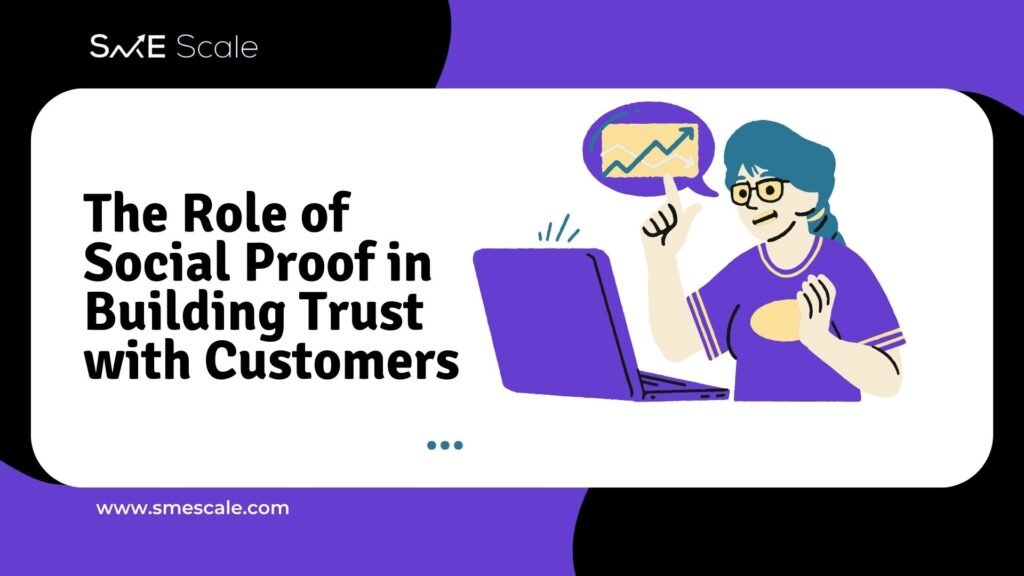The Role of Social Proof in Building Trust with Customers: Insights for SMEs

In today’s digital age, trust is a cornerstone for customer loyalty and sustained growth. For small and medium-sized enterprises (SMEs), building trust can often be the difference between thriving and merely surviving. One of the most powerful tools to achieve this is social proof, a psychological and marketing concept that leverages customer behavior and experiences to influence others. This blog explores the role of social proof in building trust, supported by real-life examples, actionable strategies, and insights into the psychology behind it.
Understanding Social Proof and Its Psychological Basis
Social proof stems from a basic psychological principle: humans are inherently social creatures who look to others for cues on how to behave, especially in uncertain situations. This phenomenon, often referred to as informational social influence, drives people to mimic the actions of others they perceive as knowledgeable or trustworthy.
In marketing, social proof appears in various forms:
Customer testimonials and reviews
Case studies and success stories
Social media endorsements
Industry certifications and accolades
User-generated content (UGC)
For SMEs, leveraging social proof is about demonstrating value through the voice of others, making potential customers feel confident in their decision to engage with your brand.
The Impact of Social Proof on SMEs
A compelling example of the effectiveness of social proof comes from SME Scale’s own approach. The company offers a “Growth Guaranteed” promise, which reassures clients by tying their services to tangible results. However, what truly strengthens this claim is the abundance of client success stories shared on their platform.
One such case study involved a boutique retail SME struggling to expand its online presence. SME Scale implemented a strategy that included leveraging customer testimonials prominently on their website. By highlighting satisfied customer experiences, the SME saw:
A 30% increase in website conversions.
A significant boost in trust and credibility among first-time visitors.
Improved retention rates due to the transparency and authenticity conveyed through real stories.
This demonstrates how showcasing social proof, when integrated into a strategic marketing plan, can yield transformative results.
Real-Life Case Study: Turning Reviews into Revenue
A real-world example outside SME Scale’s domain illustrates the power of social proof. Consider the global success of Airbnb. Initially, the platform struggled to attract users. However, when it started featuring user reviews and ratings, it saw a dramatic uptick in bookings. Customers trusted the opinions of previous guests over the company’s marketing claims.
This mirrors the psychological concept of the bandwagon effect, where people are more likely to trust and follow popular or collective actions. For SMEs, creating an environment where customers willingly share their positive experiences can be a game-changer.
Actionable Tips for SMEs to Harness Social Proof
Leverage Customer Testimonials
Display authentic quotes from happy customers on your website, social media, and marketing materials. Ensure these testimonials are specific and relatable to your target audience.
Encourage Online Reviews
Platforms like Google My Business, Yelp, and Trustpilot can amplify your brand’s credibility. Actively request reviews from satisfied customers and respond to feedback to show you value their input.
Showcase Success Stories
Develop case studies that outline challenges, solutions, and results. These stories humanize your brand and provide concrete evidence of your expertise.
Utilize Social Media Mentions
Share and engage with user-generated content, such as posts or videos, where customers express satisfaction with your products or services.
Collaborate with Influencers
Partner with influencers who align with your brand values. Their endorsements serve as a form of social proof that resonates with their audience.
The Psychology Behind Why It Works
Social proof works because it reduces perceived risk and creates a sense of belonging. When customers see others praising your product or service, they feel more confident in their decision. This phenomenon is closely tied to cognitive biases such as:
Authority bias: People trust endorsements from experts or industry leaders.
Consensus bias: The more people vouch for a product, the more credible it seems.
Similarity bias: Customers are drawn to reviews and testimonials from individuals who share their challenges or demographics.
Integrating Social Proof into Your SME’s Strategy
For SMEs, integrating social proof into the customer journey is essential for building trust and credibility. Platforms like SME Scale specialize in helping businesses create content, such as customer success stories, that enhance brand trust. Combining these efforts with a solid understanding of your target audience ensures that your social proof resonates effectively.
Conclusion
Social proof is not just a marketing tactic; it’s a trust-building mechanism rooted in psychology. By effectively leveraging customer testimonials, reviews, and success stories, SMEs can bridge the trust gap, drive engagement, and foster long-term loyalty.
If you’re looking to scale your SME sustainably and need guidance on integrating social proof into your marketing efforts, consider exploring SME Scale’s tailored solutions. Remember, the voice of your customers can be your greatest asset in earning the trust of new prospects.


